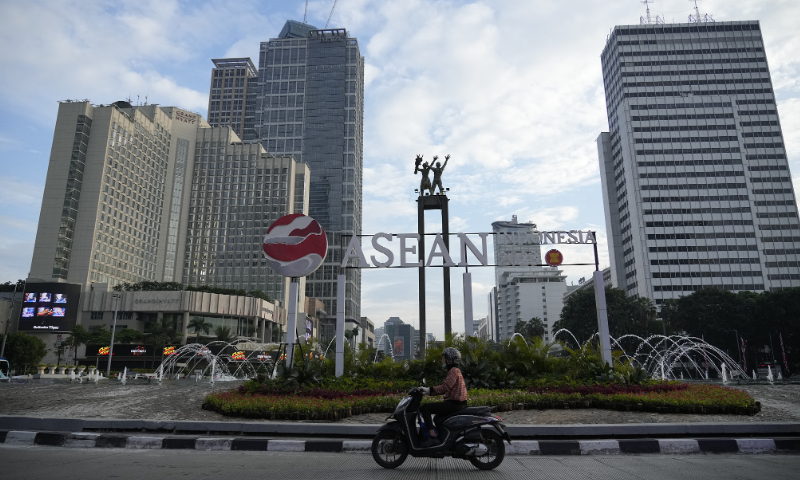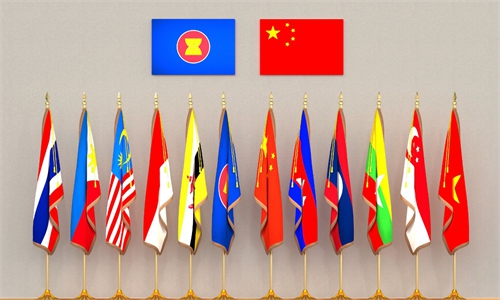East Asian states need to strengthen guard against 'great external threat': Global Times editorial

Photo: VCG
ASEAN-plus Foreign Ministers' Meetings will be held in Jakarta, Indonesia, on Thursday and Friday. Wang Yi, Director of the Office of the Central Commission for Foreign Affairs, will attend the gatherings, demonstrating China's high regard for the meetings and China's relationship with ASEAN. The meetings will focus on several topics related to regional peace, stability, and economic recovery. We would like to take this opportunity to sincerely remind ASEAN to strengthen its vigilance against external forces instigating trouble, as this has become the most serious external threat that could undermine the cooperation environment and development momentum between ASEAN and regional countries.
In recent days, foreign media have been hyping the South China Sea issue. Even before this year's relevant meetings started, the US has been continuously making statements, trying to set the tone for the meetings in advance. Prior to US Secretary of State Antony Blinken's visit to Jakarta, the US State Department claimed that his trip aimed to closely cooperate with Southeast Asian countries to "counter" China's actions in the South China Sea. The Japanese media also mentioned that the participation of Japanese Foreign Minister Yoshimasa Hayashi aimed to rally ASEAN countries to restrain China and further intensify the South China Sea issue. Furthermore, the US, Canada, Australia, and some European countries recently started to make an issue of the so-called South China Sea arbitration ruling.
Regarding these high-profile political shows, we believe that ASEAN will remain clear-headed and calm. As a matter of fact, ASEAN is already vigilant about this. Indonesian Foreign Minister Retno Marsudi, stated in her opening speech at the ASEAN Foreign Ministers' Meeting, "We need to send a clear message that ASEAN will never be a proxy in great powers' rivalry." Over the past two years, ASEAN representatives have repeatedly reiterated this position in various major multilateral occasions, indicating that they have felt pressure from this aspect and are aware of the huge risks involved.
Currently, there are two forces engaging in a game in the South China Sea region. On one hand, the US is intensifying its containment and suppression on China, continuously creating conflicts in the region in an attempt to drive a wedge between China and ASEAN. On the other hand, the regional countries strongly desire stability, peace, and development. Particularly after taking some detours in handling the South China Sea issue in previous years, countries have realized how important it is to properly address sensitive hotspot issues. In recent years, major regional countries have explicitly or implicitly rejected picking sides, signifying a collective sobriety and rationality within the region.
However, in the foreseeable future, the intensity of external forces' involvement in East Asian affairs will only increase rather than weaken, and their methods will be more covert and deceptive. Under the guise of promoting "cooperation" and "security," their actions involve decoupling, provoking friction, and fostering confrontation, in order to entice regional countries into joining the camp that seeks to contain and restrain China. All 10 ASEAN countries are China's neighbors, and the US not only aims to rope ASEAN as an organization in, but also adopts a strategy of divide and conquer among its member states. US officials have paid increasingly frequent visits to ASEAN countries, and the South China Sea issue has become the biggest leverage point for the US and its allies to exploit.
It's a reality that there are disputes concerning the South China Sea issue. However, China and countries directly involved have together put this dispute under control, preventing it from becoming an insurmountable obstacle to economic and diplomatic cooperation and friendship among all parties. It is a common goal for everyone to turn the South China Sea into a sea of peace, friendship and cooperation, and significant progress has already been made. ASEAN has played an irreplaceable constructive role and has met China halfway in promoting the "Code of Conduct in the South China Sea." The tense situation in the South China Sea is not in the interests of ASEAN countries and China.
Every time relevant negotiations in the South China Sea show signs of progress and the situation appears to be easing, the US takes action. It either sends warships and military aircraft to the South China Sea to flex muscles, or defames China's legitimate actions in the waters. It also incites relevant countries in the South China Sea to confront China. The calmness in the South China Sea is obviously not what the US and other countries hope to see. They first stir up external public opinion regarding the South China Sea, and then disrupt the situation in the region. It cannot be ruled out that certain countries in the South China Sea may make wrong choices and set a wrong example. In this regard, regional countries need to keep their eyes open.
Against the backdrop of challenges such as global economic slowdown and geopolitical conflicts, the overall situation in East Asia is a bright spot, and the high-level mutually beneficial and win-win relationship between China and ASEAN is the highlight of this bright spot. This is not easy to achieve and has become a model of the most dynamic and fruitful achievements in the Asia-Pacific region, effectively promoting regional peace, stability, and prosperity. This situation needs to be cherished and jointly maintained by all parties, especially in the face of "external threats."



